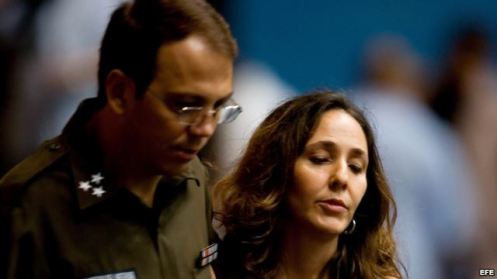Juan Juan Almeida, 27 March 2015 — With the approach of the next congress of the Cuban Communist Party, scheduled for 2016, some analysts are adhering to a prudent logic by predicting that Alejandro Castro Espin will be included on the list of possible successors to the Cuban throne.
They cling to this notion with amazing aplomb. But the prospect of Alejandro being included in any list of possible successors is likely to dissipate even before it can happen. Very intelligent people often make the mistake of advancing elaborate theories such as this by standing back and looking at the surface but mistaking the spots of a Dalmatian with those of a Holstein.
Clearly, Alejandro has managed to hone the proverbial skill of political oratory. He acts as a government spokesperson and, what he does not know, he makes up. His peculiar gift for being able to memorize and recite the complete works of Lenin can be astonishing. He is one of the most powerful people in Cuba today and has a hand in important national decision-making. But he is forever caught between the image of a hero and the verses of the Iliad, which ominously conflate modern-day Havana with an epic Greek saga.
Alejandro is not a member of the Secretariat nor the Politburo nor the Central Committee nor the National Assembly. Nor does he represent (or claim to represent) any major social group. This is why I believe his sister Mariela is better poised to compete for the same office.
Alejandro wrote a book, The United States: The Price of Power, translations of which we can find in several languages. But, although available, it remains practically invisible, having failed to garner the respect of artists and intellectuals who, among other things, know that the author of this indigestible work is really Juan Francisco Arias Fernandez, also known as Paquito, his faithful squire.
Yes, Alejandro is a military man. He is also cold, calculating and ambitious. But he lacks influence with the military’s commanders. Some of them, the oldest officers, formed their ties during the battles in the Sierra Maestra. Others, the mid-level officers, did so during Cuba’s wars in Nicaragua, Ethiopia and/or Angola. The rest, those comfortable in the wheeling and dealing of the marketplace of influence, belong to a group none of whose members would consider jeopardizing a profitable present by clinging to a past that has no future.
Vilma and Raul’s son does not fit into any of the Castro categories. Though he did pass through Angola, he did not take part in the war. After a shooting accident during training practice in Luanda, he returned to Havana and was decorated as though he had been wounded in battle, something that remains a source of jokes even today.
Of course, they can handpick him. They can make him president or field marshal. Even Raul knows that appointing Alejandro would establish a precedent that would withstand the culture of silence and the fear of the Cuban people. But it would amount to a slap in the face to the intelligentsia, and would turn a hierarchical structure like the military into a tinderbox and every general into a lighted match.
Bets are only made when the chips are on the table. To put it simply, Alejandro is someone who will remain relevant only as long as Raul Castro is alive.

